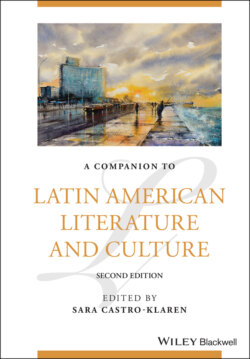Читать книгу A Companion to Latin American Literature and Culture - Группа авторов - Страница 61
Rodríguez Freile’s Opportunity as A Farmer
ОглавлениеWhen the indigenous communities were first subjected to the encomienda system in the region (ca. 1538) and provided the agricultural goods needed by the Spanish population, they still lived and farmed in their ancestral lands, which at the time were largely untouched by Spanish confiscations. However, by the end of the sixteenth century, and with the demographic collapse of the indigenous population, the state aggressively encouraged the relocation and confinement of the remaining population into poblamientos (towns) and resguardos (reservations of sorts). The move was intended to break the encomenderos’ monopoly over the indigenous labor force as well as more easily control the indigenous people for religious proselytism and the Spaniards’ and criollos’ own labor demands. This move also freed more indigenous land for the colonizers’ confiscations. El carnero illustrates this situation when dealing with president Andrés Venero de Leiva’s term in office. According to Rodríguez Freile, he “ardently encouraged the natives’ conversion by making them live close together in their towns and by supporting their churches” (Chapter 10).
The increase in the Spanish and criollo urban population and the native’s demographic collapse broke the original balance between the needs of colonizers and the indigenous economy to satisfy them, which supported the encomienda system. The result was the emergence of the first estancias (farms juridically different from the encomienda) around the land of the encomenderos, one of which was acquired by Rodríguez Freile. In other words, the author of El carnero found his economical opportunity with the breakup of the encomendero power. And since by then the indigenous were not able to make a living by solely cultivating the small land of their resguardos, they were compelled to work in the Spaniards’ and criollos’ farms. This was very probably Rodríguez Freile’s source of labor for his own estancia. These farms, once Spanish legislation made it easier to secure an indigenous labor force, were able to create a type of agricultural unit capable of supplying the cities and mining centers in and outside the Santafé de Bogotá area with cereals, dairy products, and root vegetables.
These intricacies of the social inequalities among Spaniards, criollos, poor mestizos, and the indigenous are totally erased in Rodríguez Freile’s self-portrait as an estanciero, an erasure that has been preserved by most nineteenth- and twentieth-century readings of El carnero. This is evident when Rodríguez Freile, paraphrasing the Latin poet Horace and resorting to a literary trope known as beatus ille (praising the charms and simplicity of country life), proudly proclaims:
Fortunate is the man who, far away from business, and with modest assets, quietly and peacefully retires; he whose nourishment is assured by the fruits of the land that he cultivates, because, as virtuous as mother nature is, it produces them; fortunate is the one who does not expect his reward from the hands of greedy and tyrannical men. (Chapter 21)
